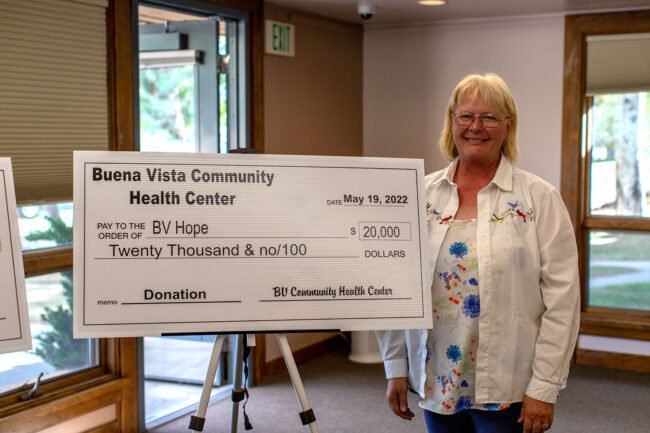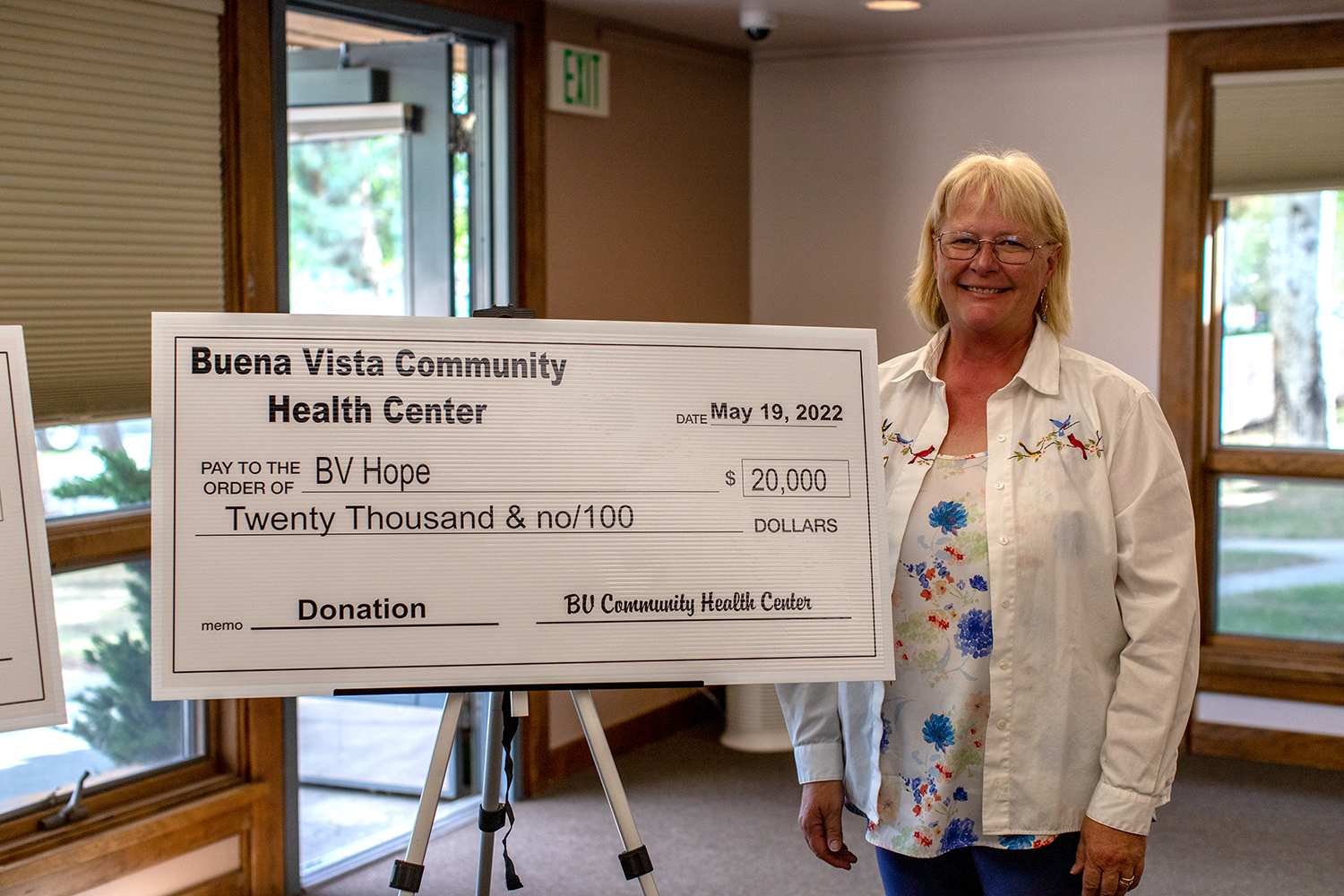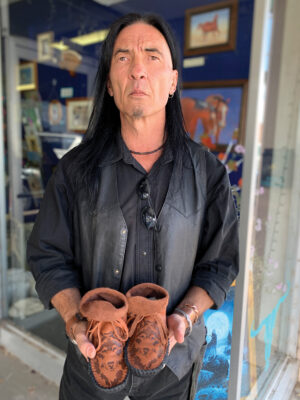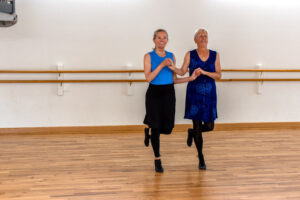This piece has been updated.
For the record: The Q&A skit was presented only to fifth grade students.
THE ELEMENTARY SCHOOL IN BUENA VISTA is — like the rest of the town — a safe and tranquil place. So why would school administrators expose children to messages about sexual exploitation and human trafficking? The answer can be found in the promise that Beth Ritchie, a veterinarian and home-schooling mom, made to herself eight years ago after reading testimony from sex-trafficking survivors.
Thanks to Ritchie, Chaffee County (population ~22,000) has become a hothouse of activism and education about human trafficking, also known as modern slavery. Hundreds of people have joined marches, rallies and fundraisers for BV Hope, the nonprofit Ritchie runs. High school students have written and performed skits about trafficking at elementary schools. Churches regularly invite Ritchie to speak, and their members donate new clothes, toiletries and stuffed animals to fill “hope bags” for children and families recently rescued from forced labor. And Ritchie and her team have raised $85,000 for Haven for Hope, a sanctuary home for women survivors she has vowed to open by 2026.
Ritchie took on this mission a little over eight years ago after reading a first-person article in a Christian magazine by a female American sex-trafficking survivor. The survivor described how, as the teenage daughter of a struggling single mom, she supervised her younger siblings at the local swimming pool. A kind woman at the pool befriended her, won her confidence and offered to help her family financially. “Before she knew it, she was in a motel room,” said Ritchie. “It took her three years to escape from the traffickers. This is not an uncommon story. But at the time, I had no idea this kind of thing happened in America.”
Suddenly, Ritchie was reading and hearing stories about human trafficking — in the United States and internationally — everywhere. “It all came flooding in,” she said. At a Christian women’s conference in Denver, she heard Christine Caine, founder of the A21 anti-slavery organization, speak. “She was a powerhouse,” said Ritchie. And after hearing Caine, Ritchie made her covenant. “I thought, I can either crawl under a rock and hope it goes away, or I can do something to make a difference.”

Zack Bearss, the pastor of Clearview Community Church, remembers how profoundly Ritchie was affected by what she was learning. “At the time, she was in charge of our women’s bible study ministry,” said Bearss. “She told me, ‘I feel I’m supposed to step away and start something, but I don’t know what that would look like.’”
Bearss encouraged her. “You need to go after this,” I said. “It’s something deep in your soul.” At the same time, he sensed that she was embarking on a challenging “pathway that had never been charted.” Most residents of Chaffee County “saw human trafficking as a big-city issue,” Bearss recalled. They would donate money to help survivors, but Ritchie was looking for more. “She felt we needed to be stirred to action.”
While working and raising her kids, Ritchie set up BV Hope as a tax-exempt nonprofit. She recruited volunteers and began speaking to churches. Importantly, she established collaborative relationships with several Colorado anti-trafficking organizations.
Colorado-Springs-based Reclaiming Hope regularly asks BV Hope for “hope bags” of personal care and comfort items for newly freed survivors. Denver’s Laboratory to Combat Human Trafficking provides trainings and seminars to keep the BV Hope team up to date on trends in forced labor and the evolving needs of survivors. And Fort-Collins-based U COUNT supplies totes, purses, bandanas and other items handcrafted by survivors in India and other developing countries.
“One hundred percent of the price for those beautiful craft items goes to the survivor, and $20 for a woman in India goes a long way,” said BV Hope Treasurer Laurie Stiles, who has worked with Ritchie and other volunteers to sell the U COUNT items at Buena Vista’s seasonal craft fairs.
Occasionally, someone at one of these events introduces themselves as a survivor. “I met a woman at the last Christmas craft fair who said she was a survivor,” said Stiles. “Another woman told me her sister was.”
These moments are moving, and they don’t often happen in Chaffee County, where Ritchie and Stiles said human trafficking is quite rare but does occur. But Ritchie pointed out that more trafficking than she was aware of could be going on, perpetrated by the people most trusted by the young victims. “Unfortunately, it’s often family members or someone like a neighbor who abuses and traffics young people,” said Ritchie. The fact that trafficking could be happening under the cloak of family secrecy — and the reality that many Chaffee County kids leave the sheltered valley after high school — motivated Ritchie to bring anti-trafficking messages into Buena Vista’s Avery Parsons Elementary School.
The school was already using the Second Step abuse awareness curriculum and, at first, Ritchie and other female volunteers simply role-played Second Step skits. Things got more interesting when the high school drama class started performing the skits. “The kids became more attentive and engaged,” said Avery Parsons School Counselor Michelle Cunningham.
Then the high schoolers began writing original skits — a process that was both creatively and emotionally demanding for the teens. “Some of my students love working on these projects and some may be re-triggered by past trauma and have to be more cautious with how much they invest in a particular scene,” said Buena Vista High Drama Teacher Tanner Oharah. “But in general, the older kids are very excited to have the opportunity to help protect those more vulnerable than themselves, and I think it also raises awareness of their own risks and surroundings.”
One skit — a Q&A with “Carolina” — features a 13-year-old girl who was manipulated into prostitution after running away from her abusive home. The skit is only presented to students in fifth grade. Abstract language is used to describe sexual exploitation: “[They] made me do things I didn’t want to do.” Parents are notified in advance of such presentations and given the chance to opt their children out.
11 Quick Facts from: It's Not About the Sex by John DiGirolamo • Average entry age is 12-14 for girls and 11-13 for boys. • On average one victim can make more than $300,000 in revenue for their trafficker. That can mean they are raped anywhere from 15-20 times per day. • 67% of sex buyers are middle-aged white men. • The life expectancy of a human trafficking victim is seven years. • 300,000 children each year are at risk of some form of sexual exploitation. • 60% of exploited children are recruited by peers. • The majority of runaways, homeless, abused and at-risk children are approached by pimps and drug dealers within 48 hours of landing on the streets. That equates to one out of three being lured into sex trafficking. • As many as 2.8 million children run away each year in the U.S. • Children who are sexually abused earlier in childhood are four times more likely to be targeted and victimized by commercial sexual exploitation. • Pimps use the internet, text messages and digital web cameras to set up “dates,” making them more difficult to find. • It is a crime that hides in plain sight. For more information visit itisnotabout.com.
With the pandemic, the skits were presented by video. But Ritchie is eager to renew the face-to-face presentations that seemed to strongly impact audiences and performers.
While “Carolina” is fictitious, except for a few details, she could be Coloradan Jessa Dillow Crisp. According to People and other sources, Crisp was forced into prostitution and pornography as a child by her family. After escaping to a safe house in Vancouver, she was manipulated again into prostitution by a female pimp who had befriended her. She eventually escaped and found her way to a sanctuary home in Colorado Springs.
Crisp is one of Ritchie’s heroes. And Crisp, who has since become a speaker, trainer and consultant on human trafficking, is a fan of Ritchie’s work. In fact, she appeared as keynote speaker at Haven for Hope’s recent gala fundraiser. Attended by about 150 people, the event raised $15,000 for the sanctuary home that Ritchie says will be something like the one in Colorado Springs that sheltered Crisp and supported her to make her final escape from forced sexual exploitation.
Ritchie has promised herself that Haven for Hope will open in 2026 somewhere in Chaffee County. She’s meeting monthly with staff from Thistle Farms, a Tennessee group whose model for a survivors’ recovery house she intends to follow. “On average, it takes a survivor two years to feel safe again and achieve the emotional and financial stability to re-enter the world,” said Ritchie.
Ritchie’s work evokes discomfort and pushback from some. “It took me years to convince my own mom that people being trafficked were not at fault.” And Ritchie lost a BV Hope board member when she publicly challenged conspiracy theories about human trafficking.
While Ritchie is an evangelical Christian, she assiduously cultivates support across religious and political lines. “If we’re all working together — left and right; Christian, Jewish, Muslim, Buddhist — we can stop this. If we squabble over our differences, that will only help the perpetrators thrive.”
“She’s giving us the opportunity to step into learning and awareness of this problem in ways that have made it very real to us,” said Pastor Bearss. And because Ritchie is widely known and trusted, she has been able to educate people about these grim topics in ways that state and national groups would have found more difficult, according to Bearss.
“She’s been allowed into the schools, where she has educated our kids about this issue,” said Bearss. “My own daughter Anna got interested in human trafficking because of Beth. She has since worked in Thailand and in Ecuador with survivors of human trafficking.” Now in college, Bearss’ daughter is studying counseling with the goal of assisting survivors. “She has a vision of using the outdoors and wilderness to help survivors heal.”
Bearss and other supporters often describe Ritchie with adjectives like “amazing,” “exceptionally dedicated” and “visionary.” But Ritchie insisted, “I’m no one special. I just wanted to make things better for victims and survivors. I’m just someone who wanted to make a difference in their community.”
Jim Hight, Buena Vista, has been a writer for longer than he cares to admit. Jim is also a moderator for Braver Angels, the national group that seeks to depolarize America by bringing people on the left and right together for civil discussion and debate. JimHightWrites@gmail.com.
This article is sponsored by Mark Zander and Leslie Champ.



